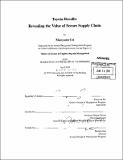| dc.description | Summary: The warning bells are ringing. Once a global auto giant with a gold-plated reputation for safety and reliability, Toyota has stumbled. Its engineering excellence and traditional craftsmanship are being watered down by years of nips and tucks. With a torrent of high-profile recalls at the beginning of the new decade and a series of highly publicized legal charges, Toyota is all over the headlines. Following a business strategy that sacrifices its customer-first focus but in favor of driving shareholder value, Toyota gradually has shifted away from the tenet of lean manufacturing. Seeking cost leadership and market leadership has gone too far, and differentiation through quality, reliability and fuel efficiency becomes blurred. The execution of such business strategy in the past few years has lured Toyota to rush into relationships with suppliers it has not adequately vetted and to apply questionable security measures as it sourced parts from all around the world. In so doing, Toyota has been constantly adding stress to the security of its supply chain. In the end, its risk mitigation capability does not improve and quality standards have lapsed. Globalization and commoditization have forced today's businesses to focus on cost-cutting and growth to achieve profits of struggle to survive. Consequently, offshoring and outsourcing have become common practice. In such a competitive environment, supply chain is the lifeblood of a business and supply chain security is well-recognized as a competitive advantage and even a marketing tool. Security Secure supply chain is critical in product quality assurance and combating counterfeit, for which authoritative product attribute service represents an urgent need. For a long time, product attribute service is considered a Business-to-Business application. Trading partners of a supply chain build and share product information amongst themselves. Consumers are basically excluded from accessing such information. On the other hand, typically, product information provided to the end consumers are maintained by individual retailers. Such an approach is heterogeneous, error-prone, inaccurate, incomplete, and it undermines consumer confidence. There is a gap for authoritative product attribute service (APAS) that can provide uniform, validated, timely and complete product info to the end consumers. With APAS, consumers will play an active role in monitoring and contributing to the security of the supply chain. With a mobile barcode scanner or mobile RFID reader in hand, consumers will become a vibrant force in combating counterfeits, detecting 'bogus' status and reducing illegal trade. Consumers will benefit from such new capability by protecting their rights to buy genuine products with correct status and through legitimate channels. In addition, a spectrum of important mobile commerce applications will be made possible, such as trustful product attributes retrieval, attribute-based product search and comparison, product rating and commenting. With APAS, brand owners and other supply chain partners will see unprecedented possibilities such as direct customer-facing product marketing e.g. product recommendation, individualized coupon promotion, as well as direct user feedback on feature request and defect report. All of this will allow them to build competitive advantages with shorter user interaction cycles, more fragile to user demand variation, targeted and efficient product design, responsive product recall, and more effective in attacking counterfeits. In this thesis, I strive to provide a timely in-depth analysis on the mechanisms behind Toyota's crisis, especially the linkage between business strategy and supply chain security. I will relate secure supply chain to competitive advantage, and authoritative product attribute service to secure supply chain. Based on this, I perform strategic analysis and propose an architectural design for product attribute service. As a proof of concept, I design and implement a prototype of APAS with decent size of APAS repository and support for both mobile and PC clients. To this end, I first formulate the problems and explain the motivations behind secure supply chain and product attribute service. I then give an overview of the journey of Toyota from the synonym of quality to the reminder for product recalls. To provide further more background knowledge, I will examine business strategy and competitive advantage, together with secure supply chain, in the following two chapters. In particular, I will be deliberating on the causality between business strategy and supply chain strategy, and how supply chain vision and strategy can lead to operational executions that are sources of QA crises. In the next section, I provide details on architectural design for Authoritative Product Attribute Service. Afterwards, I describe the prototyping and implementation of APAS that covers the backend product attribute repository, the web backend that powers the APAS, as well as the Android-based mobile frontend. Finally, I summarize with concluding remarks and outline directions for future research. | en_US |
